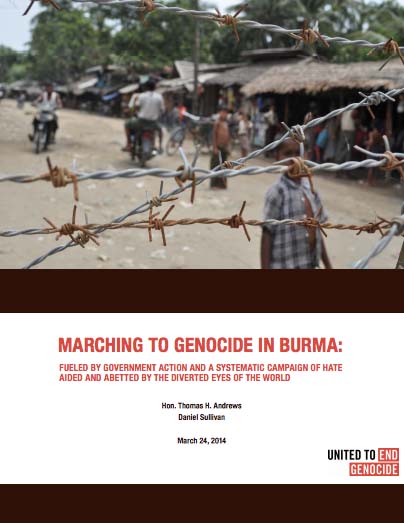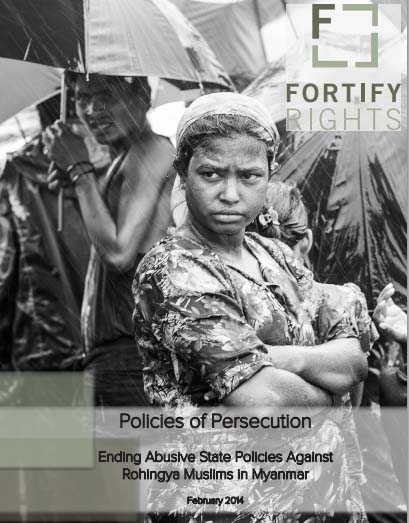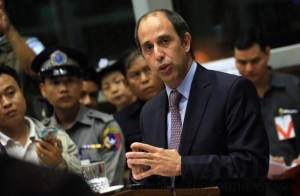Posts Tagged ‘Rohingya’ (311 found)
Burma: Postpone Flawed Census to Avert Violence
(New York) – Burma’s national government should postpone the planned nationwide census to prevent growing communal violence and attacks on the aid community, Human Rights Watch said today. At greatest risk are vulnerable Muslim communities and aid workers from international organizations […]
• • •Marching to Genocide in Burma – New Report by United To End Genocide
 United to End Genocide completed a four week fact-finding mission to Burma on March 16, 2014. What we discovered was alarming. Nowhere in the world are there more known precursors to genocide than in Burma today. Hundreds have been killed with a death toll mounting daily, tens of thousands have fled under the most hazardous conditions, and 140,000 have been forced into horrible, overcrowded camps where they face severe restrictions and are denied basic necessities including medical care[…]
United to End Genocide completed a four week fact-finding mission to Burma on March 16, 2014. What we discovered was alarming. Nowhere in the world are there more known precursors to genocide than in Burma today. Hundreds have been killed with a death toll mounting daily, tens of thousands have fled under the most hazardous conditions, and 140,000 have been forced into horrible, overcrowded camps where they face severe restrictions and are denied basic necessities including medical care[…]
Myanmar: MSF Acknowledges Encouraging Dialogue on Rakhine but Clinics Remain Closed
Jakarta, 24 March 2014 – Since Médecins Sans Frontières (MSF) Holland was ordered to suspend all activities in Rakhine State on February 26, the organisation has been engaged in high-level discussions with the Union Government of Myanmar on the need to maintain essential medical services for the many hundreds of thousands of vulnerable people in the state currently facing a humanitarian medical crisis […]
• • •MYANMAR: ABOLISH ABUSIVE RESTRICTIONS & PRACTICES AGAINST ROHINGYA MUSLIMS
 The 79-page report, Policies of Persecution: Ending Abusive State Policies Against Rohingya Muslims in Myanmar, produced by Fortify Rights is based primarily on the analysis of 12 leaked official documents and a review of public records, as well as interviews with Rohingya and others in Myanmar and Thailand. The documents published in the report reveal restrictions that deny Rohingya basic human rights, including the rights to nondiscrimination, freedom of movement, marriage, family, health, and privacy. All of the restrictions and enforcement methods described in the report appear to be in effect at the time of writing.
The 79-page report, Policies of Persecution: Ending Abusive State Policies Against Rohingya Muslims in Myanmar, produced by Fortify Rights is based primarily on the analysis of 12 leaked official documents and a review of public records, as well as interviews with Rohingya and others in Myanmar and Thailand. The documents published in the report reveal restrictions that deny Rohingya basic human rights, including the rights to nondiscrimination, freedom of movement, marriage, family, health, and privacy. All of the restrictions and enforcement methods described in the report appear to be in effect at the time of writing.
“Regional Order 1/2005,” obtained by Fortify Rights, lays the foundation for a two-child policy enforced in Maungdaw and Buthidaung townships, requiring Rohingya “who have permission to marry” to “limit the number of children, in order to control the birth rate so that there is enough food and shelter.” This order—which in practice translates to a strict two-child policy— also prohibits Rohingya from having children out of wedlock […]
• • •Statement From Members Of The European Burma Network
Members of the European Burma Network express their deep concern at reports of further massacres of members of the Rohingya ethnic group in Burma. The report by the United Nations that at least 48 Rohingya men women and children have been killed, and that police were involved, provides yet more evidence that the current approach by both the government of Burma and the European Union to address ongoing abuses against the Rohingya is failing […]
• • •Rohingya Women and Children Raped and Killed
On 13th January 2014, in the early morning at around 3 am, a group of police, security forces, military and Rakhine entered Kiladaung village, south of Maungdaw, Arakan State. They entered a house and demanded valuables, gold and money from the Rohingya woman living there. Her husband had hidden when they saw the security forces approaching. When the woman refused to give them her jewellery, the security forces raped and killed her. When her children began shouting, many villagers came and violence started […]
• • •Secret Camps Holding Rohingya Refugees Must Be Closed Immediately
On International Migrants Day the Mekong Migration Network Calls for Urgent Action To Protect Asylum Seekers
The Mekong Migration Network (MMN) strongly condemns the abusive treatment of the Rohingya in Myanmar and in Thailand. Members of MMN who represent civil society groups working on labour, women and migration issues in all of the countries of the Mekong subregion, are shocked by the treatment of the Rohingya people […]
• • •Resolution to End Persecution of the Rohingya in Burma Introduced
U.S. Government and International Community Must Help Stop Discrimination and Violence Against Rohingya and other Minority Groups
Physicians for Human Rights (PHR) welcomed the introduction of a resolution that aims to end discrimination against the Rohingya, a minority group in Burma (officially the Union of Myanmar) that is one of the world’s most persecuted ethnic groups […]
• • •Commission Meets with Residents of Strife-Torn Rakhine
Representatives of the Myanmar National Human Rights Commission have met with community leaders and other residents of riot-torn Rakhine State.
Radio Free Asia reported that the Commission members urged the importance of containing communal violence in a bid to uphold human rights, following the deadly clashes that occurred last year […]
• • •UN Special Rapporteur Demonstrates Ongoing Grave Human Rights Violations
 On 24 October, the Special Rapporteur on the situation of human rights in Myanmar, Tomás Ojea Quintana, presented his report to the United Nations General Assembly. The content of Quintana’s report demonstrates a continuing and, in some cases, a worsening of the human rights situation in Burma today, thus illustrating how imperative it is for the mandate of the Special Rapporteur to be continued.
On 24 October, the Special Rapporteur on the situation of human rights in Myanmar, Tomás Ojea Quintana, presented his report to the United Nations General Assembly. The content of Quintana’s report demonstrates a continuing and, in some cases, a worsening of the human rights situation in Burma today, thus illustrating how imperative it is for the mandate of the Special Rapporteur to be continued.
Of particular concern for Quintana is the situation for Muslims in Burma in the wake of a number of outbreaks of violence in the past 18 months. There are currently 140,000 displaced Rohingya living in camps in Arakan State, segregated from the rest of society. Quintana also stated that the Burma government is not doing enough to address the root causes of this violence, one of which is the institutionalized discrimination against Rohingya, denying them legal status under the 1982 Citizenship Law. Another alarming situation for Quintana are the measures brought in since the violence that have placed restrictions on access to livelihoods, education and healthcare that enforced segregation has facilitated. Furthermore, Quintana expressed deep concern over the role of the authorities themselves in instigating the violence: “Allegations of gross violations since the violence erupted last June, including by state security personnel, remains unaddressed” […]









 All posts
All posts